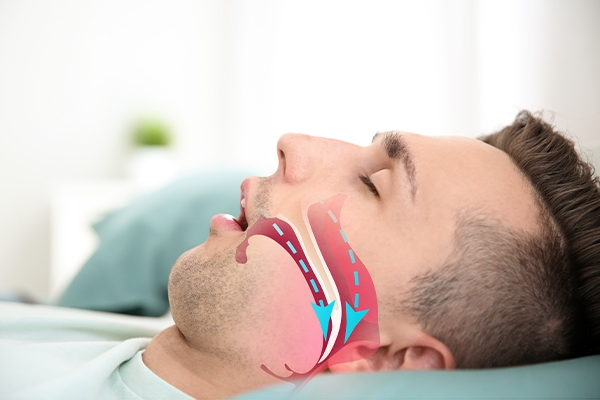Why Do People Snore and How Dangerous Is It?

Almost 45% of adults snore on occasion. Some of them are unaware that they are snoring while sleeping. Snoring is commonly considered a symptom of deep slumber caused by weariness in our culture. But what if your snoring is causing you health problems?
Babies and children, like adults, can snore. However, unlike adults, snoring in children is typically caused by tonsil growth or swelling.
When adult men and women are compared, the number of males who snore is larger than that of women. This is due to men having narrower airways than women.
A small neck, cleft palate, swollen adenoids, and other physical characteristics can contribute to snoring. Inherited causes frequently cause snoring. If your parents snore, you are prone to snore as well.
You may, however, control your snoring by modifying your lifestyle and sleep routine, as well as exercising your throat.
Snoring happens when something restricts the airflow via your mouth or nose while you're sleeping.
When air is forced through the restricted area, the soft tissues in the mouth, nose, and throat collide and vibrate. This is what produces snoring or thumping sounds when sleeping.
Poor muscular tone, thick throat tissue, a soft palate, or a lengthy uvula are all possible causes.

Snoring may be typical for some people, but it can be a major concern for others. Snoring can sometimes indicate a chronic health problem, such as nasal congestion caused by sinus infections or allergies, nasal polyps, or septal deviation. Long-term snoring can increase the risk of heart disease, stroke, and other disorders.
Snoring is most common in overweight people, middle-aged or older men, and postmenopausal women. The more you become older, the more "noise" you make at night.
Snoring symptoms range from a light vibration or whistle to a loud grunt or rumble. Snoring creates a dry throat in some people, causing them to wake up multiple times.
This syndrome induces weariness during the day. It can also induce headaches, difficulty concentrating, and irritation.
Snoring can indicate sleep apnea, a sleep disorder where breathing stops and begins repeatedly. When an airway is blocked, the oxygen levels in the blood drop, causing the brain to signal the presence of excess carbon dioxide. We wake up for a little while at this point to reopen the airway.
This so-called respiratory arrest typically lasts 10 seconds per episode, and the average person has 5 occurrences per night.
This sleep problem raises blood pressure and heart rate, and it can be fatal.
Excessive tiredness in the morning, headaches, nausea, waking up confused at night, and difficulties concentrating are all indications of sleep apnea.
Here are some warning indicators to check for:
- You snore loudly, heavily, and exhaustively during the day.
- You are having difficulty breathing or choking while sleeping.
- You are falling asleep at inconvenient moments, such as while eating or conversing.
Treatment for snoring

Snoring caused by an incorrect sleeping position can be remedied. Changing your lifestyle can also help you stop snoring.
Here are some things you can do on your own to treat snoring:
- Sleep on the side
If you frequently sleep on your back, try sleeping on your side. When you sleep on your back, your tongue moves towards your throat, partially blocking air entry, which causes snoring. - Get enough rest
Sleep deprivation raises the likelihood of snoring by relaxing the throat muscles. This increases the likelihood of airway blockage. Snoring also raises the risk of sleep deprivation since it disrupts sleep. - Elevating the pillow
This action can reduce snoring because it keeps the respiratory tract open. - Use nasal strips
Placing a nasal strip at the bridge of the nose helps increase space in the nasal passages. Thus, you can breathe more freely. - Quit smoking
Smoking is a habit that worsens snoring. Cigarettes injure the membranes in the nose and throat, thereby blocking the airways. This is the cause of snoring. - Maintain body weight
Obesity is one of the causes of snoring. Weight loss reduces the amount of tissue in the throat that might induce snoring. - Regular exercise
Try to exercise every day. Sports develop the muscles of the body and build the muscles of the throat, improving the flow of breath. - Maintain the humidity in the air
Dry air can irritate the nose and throat lining, so keep the air in your bedroom wet. - Be mindful of what you eat before going to bed
Eating large meals or ingesting particular foods, such as milk or soy milk, before bedtime may aggravate snoring. - Treating chronic allergies
Allergies restrict airflow across the nose. This ailment requires you to breathe through your mouth. This raises your risk of snoring.
Consult your doctor about which over-the-counter or prescription allergy treatments may help you. These drugs are available in a variety of formats, including nasal sprays, liquids, and pills.
Snoring, in any case, should not be taken for granted. If someone you know snores or stops breathing while sleeping, contact a doctor right once. They may require medical treatment. Doctors can assist in diagnosing and treating snoring.
If you have snoring issues and wish to obtain treatment, click on WhatsApp.



